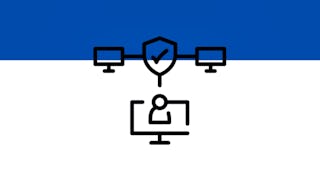Filter by
SubjectRequired
LanguageRequired
The language used throughout the course, in both instruction and assessments.
Learning ProductRequired
LevelRequired
DurationRequired
SkillsRequired
SubtitlesRequired
EducatorRequired
Explore the Network Theory Course Catalog
 Status: Free Trial
Status: Free TrialUniversity of California San Diego
Skills you'll gain: Graph Theory, Combinatorics, Algorithms, Theoretical Computer Science, Network Analysis, Data Structures, Mathematical Theory & Analysis, Bioinformatics
 Status: Preview
Status: PreviewStanford University
Skills you'll gain: Game Theory, Strategic Decision-Making, Mathematical Modeling, Mathematical Theory & Analysis, Probability, Bayesian Statistics, Behavioral Economics, Problem Solving, Social Sciences
 Status: Free Trial
Status: Free TrialAkamai Technologies, Inc.
Skills you'll gain: Network Security, Remote Access Systems, Network Troubleshooting, General Networking, Network Administration, Computer Networking, Network Architecture, OSI Models, TCP/IP, Network Infrastructure, Network Protocols, Virtual Private Networks (VPN), Networking Hardware, Intrusion Detection and Prevention, Network Model, Dynamic Host Configuration Protocol (DHCP), Network Routing
 Status: Preview
Status: PreviewThe Chinese University of Hong Kong
Skills you'll gain: Digital Communications, Combinatorics, Probability, Encryption, Information Architecture, Probability & Statistics, Probability Distribution, Telecommunications, Algorithms, Linear Algebra, Calculus, General Mathematics, Statistical Methods, Applied Mathematics
 Status: Free Trial
Status: Free TrialSkills you'll gain: Network Security, Intrusion Detection and Prevention, Network Administration, Network Architecture, TCP/IP, Hardening, Cybersecurity, Cyber Attacks, Cloud Security, Computer Networking, Network Protocols, Network Model
 Status: Free Trial
Status: Free TrialSkills you'll gain: Computer Networking, OSI Models, Network Troubleshooting, Routing Protocols, Network Administration, General Networking, TCP/IP, Network Architecture, Network Routing, Networking Hardware, Network Protocols, Virtual Private Networks (VPN), Network Infrastructure, Local Area Networks, Dynamic Host Configuration Protocol (DHCP), Wide Area Networks, Wireless Networks, Network Security, Network Model, Data Integrity
What brings you to Coursera today?
 Status: Free TrialStatus: AI skills
Status: Free TrialStatus: AI skillsGoogle
Skills you'll gain: Package and Software Management, Systems Administration, Computer Networking, IT Infrastructure, OSI Models, Desktop Support, Information Systems Security, Network Troubleshooting, Technical Support, Routing Protocols, Computer Hardware, Network Security, Cybersecurity, Microsoft Windows, Network Administration, Lightweight Directory Access Protocols, File Systems, Interviewing Skills, Applicant Tracking Systems, Resilience
 Status: Free Trial
Status: Free TrialMultiple educators
Skills you'll gain: Security Controls, Network Security, Incident Response, Penetration Testing, Software Development Life Cycle, Computer Security Incident Management, Information Assurance, Cloud Computing Architecture, Computing Platforms, Microsoft Windows, Cyber Governance, Cloud Computing, Encryption, Data Security, Authorization (Computing), Data Storage, Application Security, Cybersecurity, Information Technology, Cryptography
 Status: Free TrialStatus: AI skills
Status: Free TrialStatus: AI skillsSkills you'll gain: Email Marketing, Social Media Marketing, Marketing Analytics, Search Engine Marketing, Social Media Strategy, Media Planning, Data Storytelling, Google Ads, Marketing Effectiveness, Social Media Campaigns, Search Engine Optimization, Loyalty Programs, E-Commerce, Online Advertising, Customer Retention, Marketing, Marketing Channel, Campaign Management, Interviewing Skills, Applicant Tracking Systems
 Status: Free TrialStatus: AI skills
Status: Free TrialStatus: AI skillsGoogle
Skills you'll gain: Threat Modeling, Intrusion Detection and Prevention, Network Security, Open Web Application Security Project (OWASP), Event Monitoring, Security Controls, Threat Management, Computer Security Incident Management, Security Awareness, Threat Detection, Incident Response, Vulnerability Management, Cyber Attacks, Cybersecurity, Debugging, Relational Databases, Linux, Interviewing Skills, Python Programming, SQL
 Status: Preview
Status: PreviewThe University of Edinburgh
Skills you'll gain: Music Theory, Music, Classical Music, Musical Composition, Instrumental Music
 Status: Free Trial
Status: Free TrialBerklee
Skills you'll gain: Music Theory, Music, Instrumental Music, Music Performance, Oral Expression, Musical Composition
In summary, here are 10 of our most popular network theory courses
- Introduction to Graph Theory: University of California San Diego
- Game Theory: Stanford University
- Networking Fundamentals: Akamai Technologies, Inc.
- Information Theory: The Chinese University of Hong Kong
- Connect and Protect: Networks and Network Security: Google
- The Bits and Bytes of Computer Networking: Google
- Google IT Support: Google
- IBM and ISC2 Cybersecurity Specialist: IBM
- Google Digital Marketing & E-commerce: Google
- Google Cybersecurity: Google










